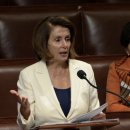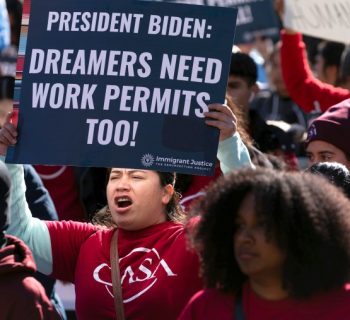By David Lauter ~ February 16, 2018 ~ LA Times
The much-awaited Senate debate on immigration produced a flop this week — no legislation, not even any memorable speeches in the manner of Senates past.
Yet the debate did clarify one key point: President Trump, who just last month said he would “take the heat off the Democrats and the Republicans” and sign any compromise Congress could reach, instead sided with his hard-line aides and killed just such a bipartisan measure with a veto threat.
For now, that leaves the fate of the so-called Dreamers largely up to the Supreme Court, which could signal its intentions as early as today.
There’s little doubt the Senate would have passed the bipartisan compromise if Trump had backed it.
The measure, as Lisa Mascaro and Brian Bennett reported, would have provided $25 billion for border security, including Trump’s often-promised border wall, in return for legalizing the status of some 1.8 million Dreamers, immigrants who were brought illegally to the U.S. as children, and giving them a 10-year path to citizenship.
It won 54 votes, short of the 60-vote super-majority needed to shut off a Senate filibuster. Senators agreed, however, that with administration backing, the remaining votes almost surely would have materialized.
Instead, the administration insisted on a hard-line measure that failed overwhelmingly, losing 39-60 — a stark repudiation of Trump’s position.
That vote came after officials sharply attacked the bipartisan bill, and White House aides, cloaked by anonymity in briefings for reporters, savaged some of its key Republican sponsors.
The bill Trump insisted on would have imposed steep cuts in legal immigration in return for resolving part of the illegal immigration issue that has stalemated Congress for more than a dozen years. The proposal fully reflected the immigration-restriction agenda pushed by Trump’s top domestic policy aide, Stephen Miller.
In the run-up to the debate, administration officials had talked up possible compromises, Bennett reported. One idea was to include provisions guaranteeing that legal immigration would be maintained for 13 years at the current level of just over 1 million people a year. In the end, those proposals, opposed by hard-line groups, went nowhere also.
SEE YOU IN COURT
Last fall, Trump ordered an end to the Obama administration’s DACA program, which shielded Dreamers from deportation and allowed them to work legally. Under his order, the program was set to begin expiring on March 5.
But two federal courts have effectively eliminated that deadline. Judges in California and New York ruled that the administration must keep DACA in place until legal claims brought by Dreamers and several states can be considered.
In the aftermath of the Senate votes, some lawmakers floated the possibility of including a short-term extension of the Deferred Action for Childhood Arrivals program as part of the next federal spending bill, which is due in late March.
Before then, however, the Supreme Court likely probably shape the battlefield.
As David Savage explained, administration lawyers have asked the high court to step in and overturn the pro-DACA court rulings on a speeded-up schedule.
If the court agrees, it could resolve the status of DACA by late June. But the justices could refuse the administration request and tell the Justice Department to first take the issue to the federal appeals courts. That would have the likely effect of keeping the status quo, with DACA still in force, well into next year.
The justices could indicate which way they’re headed as early as this afternoon.







